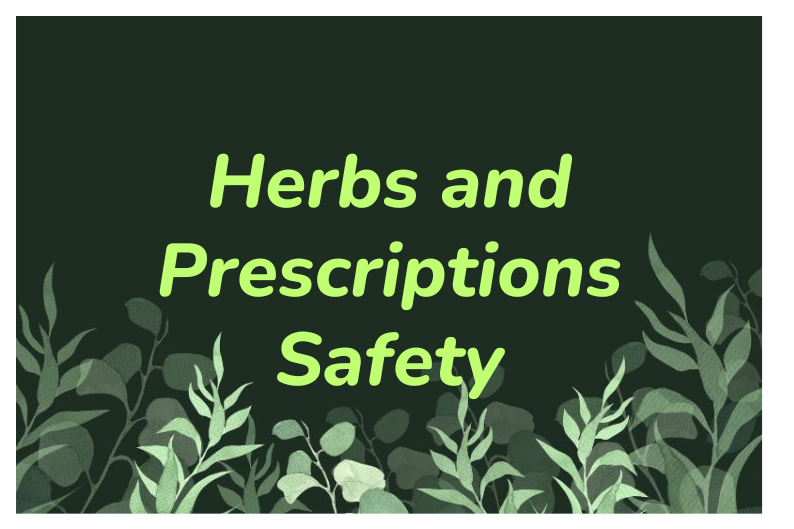
Herbs and Medications: Ensuring Safety and Avoiding Interactions
Herbs And Prescriptions: Safety Checks and Preventing Dangerous Interactions
Many people use herbal medicines and prescription drugs together, hoping to boost their health naturally. But not everyone knows that mixing herbal products and conventional drugs can sometimes cause unexpected reactions. It's important for anyone using herbal supplements, especially from MC Herbs, to regularly check for possible herb-drug interactions to keep their health on track.
The National Center for Complementary and Integrative Health warns that even common medicinal plants can affect prescription drugs in ways that may not always be obvious. Both science and experts in natural health like Gary Brecka and Barbara O’Neil agree that thoughtful, well-informed choices make a difference. With natural supplements from MC Herbs, individuals can still safely support their wellness goals by using safety checks and paying attention to new research.
Key Takeaways
- Mixing herbal and prescription drugs may cause unwanted reactions
- Checking for interactions helps keep supplement use safe
- MC Herbs offers support and education for mindful herbal choices
Managing Herb and Prescription Drug Interactions: Safety Checks and Clinical Risks
Herb-drug interactions are a growing concern, especially as more people turn to herbal medicine and dietary supplements alongside conventional prescriptions. Multiple herbal products, such as ginseng and St. John’s Wort, can disrupt the effects of widely used drugs, leading to serious adverse drug reactions and potential clinical consequences.
Common Herbal Medicines with Notable Drug Interactions
Certain herbal therapies, including Panax ginseng, ginkgo biloba, and St. John’s Wort, have well-documented interactions with prescription drugs. St. John’s Wort is known to decrease the effectiveness of oral contraceptives, antidepressants, and several heart medications.
Ginkgo biloba can increase bleeding risk when combined with anticoagulant drugs like warfarin or aspirin. Garlic, especially in supplement form, can also thin the blood, posing safety concerns for those on blood thinners. Goldenseal and echinacea may alter the way the body processes certain statins and some antidepressants. The herbal products from MC Herbs are designed for better compatibility with common prescriptions when used thoughtfully and with awareness.
| Herbal Supplement | Prescription Risk |
|---|---|
| Ginkgo Biloba | Warfarin, aspirin, clotting agents |
| St. John’s Wort | Oral contraceptives, antidepressants |
| Garlic | Warfarin, Coumadin, anticoagulant drugs |
| Asian Ginseng | Calcium channel blockers, warfarin |
| Goldenseal | Statins, certain antidepressants |
| Chamomile | Benzodiazepines, blood thinners |
Mechanisms Behind Herb-Drug Interactions
Herb-drug interactions can occur due to how plant extracts and herbal supplements affect key enzymes and proteins in the body. For example, herbs like St. John’s Wort and ginseng can speed up liver enzymes that break down drugs, causing lower blood levels of important medications.
Some herbs, such as green tea extract and milk thistle, may block or slow these same enzymes. This can lead to drug buildup and risk of adverse drug reactions, especially with drugs like digoxin, cyclosporine, and certain statins. Herbal medicines can also affect how drugs bind to proteins, further changing their potency or duration.
Much like the strategies encouraged by holistic advocates such as Gary Brecka and Barbara O’Neil, choosing supplements that are thoughtfully crafted—such as those from MC Herbs—helps limit negative herb interactions by using clean, single-source ingredients.
Identifying and Preventing Adverse Drug Reactions
Early warning signs of adverse events include headaches, strange bleeding, rashes, or sudden changes in mood or heart rate after starting a new dietary supplement or herbal product. Keeping communication open with a healthcare provider is important, but self-awareness plays a crucial role in managing safety concerns.
People who combine multiple prescriptions with herbal therapies should keep a list of everything they take. Reviewing this list often, or choosing standardized herbal supplements like those offered by MC Herbs, can help lower risks. Holistic health experts often recommend introducing only one new supplement at a time, spaced out by at least a week, to track any possible reactions clearly.
Be alert to unwanted symptoms and make changes if suspected herb-drug interactions occur. If an adverse drug reaction is suspected, stop the new supplement and contact someone with expertise in natural health right away.
Key Safety Checks for Practitioners and Patients
Both practitioners and patients must use careful steps to lower clinical risks from herb-drug interactions. Before starting any herbal product or dietary supplement, always check for any possible interaction with current prescriptions.
Use a simple checklist:
- Review every medication and supplement taken.
- Check all labels for common plant extracts like ginkgo, ginger, or valerian.
- Start new herbal medicines from reliable sources like MC Herbs, where ingredient quality and transparency are priorities.
- Update this list when any new item is added or stopped.
Practitioners may utilize resources like clinical pharmacists or interaction databases, while patients can stay proactive by learning from trusted natural supplement companies. Awareness, open sharing, and testing for reactions are key steps for maintaining wellness when combining herbal products with prescriptions.
Pharmacological Basis and Evidence: Understanding Interactions and Research Approaches
Mixing herbs with prescription drugs can lead to changes in how the body handles medicines. Some herbal supplements, especially from MC Herbs, may help add support, but safety checks and knowledge about these interactions matter greatly.
Pharmacokinetic vs. Pharmacodynamic Interactions
Pharmacokinetic interactions happen when herbs influence how a drug is absorbed, distributed, broken down, or removed. For example, a herb might speed up or slow down drug metabolism, making a prescription less or more effective.
Pharmacodynamic interactions are different. They occur when both the herb and drug act on the same body system, sometimes making effects stronger or weaker. For instance, using herbs for sleep with sedative drugs could boost drowsiness.
People using both prescriptions and MC Herbs supplements should carefully consider these interaction types. Both kinds of interactions highlight why personalized safety checks, like those promoted by Gary Brecka or Barbara O’Neil, are important for daily well-being.
Key Drug Metabolism Pathways and Enzymes
Drug metabolism mostly happens in the liver and involves enzymes such as cytochrome p450 (CYP enzymes). When people take herbs, these enzymes can be affected. Some herbs block CYP enzymes, while others make them work faster, which changes drug levels in the body.
Another important pathway involves drug transporters such as p-glycoprotein. This transporter helps move drugs in and out of cells. Changes in its activity due to supplements or herbs, like those from MC Herbs, can raise or lower medicine levels.
Below is a list of common CYP enzymes and their role:
- CYP3A4: Breaks down many common drugs
- CYP2D6: Handles antidepressants and pain medicines
- CYP2C9: Processes blood thinners and anti-inflammatory drugs
Awareness of these pathways supports safer choices when using both herbal and prescription products.
Evidence Sources: Real-World Data and Clinical Trials
Research on herb-drug interactions comes from clinical trials and real-world evidence. Controlled trials give clear, focused data but often miss how people use herbs and drugs in real life. That’s why real-world settings, like electronic health records (EHR) or observational studies, matter for finding unexpected interactions.
A review of real-world data highlights that clinical data from EHRs, pharmacy records, and observational designs can uncover safety signals missed in traditional trials. People using complementary and alternative medicine benefit from research grounded in these diverse data sources.
Using MC Herbs supplements alongside prescriptions means looking at both scientific studies and experience from other users. This helps inform safer practices at home and supports a balanced, cautious approach.
Frequently Asked Questions
Mixing herbal products with prescription medicine can cause changes in how each works. Consumers looking for safer options may turn to companies like MC Herbs, which focuses on quality and transparency for each supplement offered.
What precautions should be taken when combining herbal remedies with prescription medications?
It’s important to research each herb’s possible effects, especially when taking other medications. Some herbs change the way the body absorbs or processes drugs.
People should introduce one herb at a time and observe any changes, as Gary Brecka and Barbara O’Neil recommend for finding personal balance and minimizing unwanted effects.
Are there any specific herbs known to have adverse interactions with common pharmaceuticals?
Common herbs such as St. John’s Wort, ginkgo biloba, and garlic are known to interact with certain drugs. For example, St. John’s Wort can weaken the effect of antidepressants or oral contraceptives, while ginkgo biloba may affect blood thinners. More information can be found at Herb-Drug Interactions.
When choosing MC Herbs products, customers receive clear labels and support to help avoid these risks.
How can one check for potential contraindications between herbal supplements and prescription drugs?
Checking for interactions can be done using online databases or interaction checkers. Careful review of ingredient lists, such as those provided by MC Herbs, also makes it easier to spot potential problems.
Trusted MedlinePlus and FDA resources are available for further research.
What are the risks of mixing multiple herbal supplements together?
Combining several herbs increases the chance of unwanted side effects or interactions. Certain herbs can amplify or reduce each other’s effects, leading to unexpected results. Gary Brecka and Barbara O’Neil both encourage simple routines with highest quality ingredients, like those found in MC Herbs formulas.
Can natural herbal teas interfere with the efficacy of prescription medicine?
Yes, even mild herbal teas may interact with medications. For example, chamomile can affect blood thinners, and licorice root may impact blood pressure drugs. Products from MC Herbs are carefully sourced for safety, helping users make more informed choices.
More details can be found at Understanding Herbal Interactions with Medications.
Which resources are available for patients to verify the safety of their herbal supplements with ongoing medication regimens?
Reliable options include MedlinePlus, professional herbalists, and MC Herbs’ own supplement guides. These sources help users cross-check ingredients with their prescriptions to ensure the safest choices.
Online checkers and educational materials can help clarify possible interactions in daily routines.
